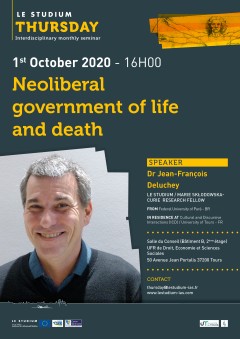Neoliberal government of life and death
Salle du Conseil ( Bât. B, 2ème étage)
UFR de Droit, Economie et Sciences Sociales
50 Avenue Jean Portalis
37200 Tours
France
Presentation
Through the observation of the phenomenon of the extermination of young black poor people in Amazonia, we will discuss how much this “politics of death” (thanatopolitics or necropolitics) is typical of the neoliberal “new way of the world” (Dardot/Laval). Michel Foucault taught us that neoliberalism is an “art of governing”, a governmentality, that is based on the “regime of truth” of the market, and that submits every individual and group to the general purpose of maximization production and accumulating capital. Our hypothesis is that the extermination of peripheral young black people in Amazonia is part of the neoliberal governmentality, by operating a valuation of human life in market-oriented terms. More marginal or “useless” is human life evaluated regarding to the needs for production maximization and capital accumulation, more vulnerable this human life will be in relation to illness, death, or indigence. As Judith Butler stated, some lives in neoliberal capitalist order seem to be “grievable” and other lives seem to be “not worthy living”, as if neoliberal governmentality should function as a framework for us to understand who deserve to die and who deserve to live, and live well. Covid-19 pandemics had revealed this differential body exposure to risk and danger in neoliberal capitalist order. The case of Brazilian extermination of peripheral young black people, or the situation of international migrants, are ones of its main and cruel manifestations.
Speaker
Dr Jean-François Deluchey,
LE STUDIUM / Marie Skłodowska-Curie Research Fellow
FROM: Federal University of Pará - BR
IN RESIDENCE AT: Cultural and Discursive Interactions (ICD) / University of Tours - FR






